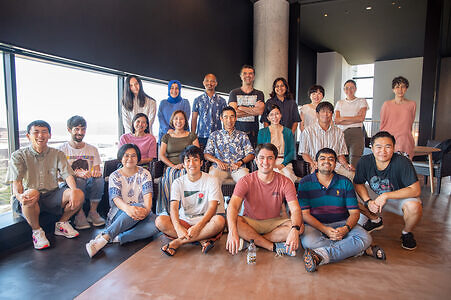Neural Computation Unit (Kenji Doya)
Neural Computation Unit
Professor Kenji Doya
Research Goals
The Neural Computation Unit pursues the dual goals of developing robust and flexible learning algorithms and elucidating the brain’s mechanisms for robust and flexible learning. Our specific focus is on how the brain realizes reinforcement learning, in which an agent, biological or artificial, learns novel behaviors in uncertain environments by exploration and reward feedback. We combine top-down, computational approaches and bottom-up, neurobiological approaches to achieve these goals.
We take three major approaches:
- 1) Computational theory of reinforcement learning and Bayesian inference in the brain.
- 2) Biological experiments on the cortex, basal ganglia and neuromodulatory systems.
- 3) Robotic experiments of multi-agent learning and embodied evolution.
By combining theoretical, biological, and engineering approaches, we aim to produce novel software tools for dynamic modeling, autonomous robots with social capabilities, and new approaches to understanding, therapy and prevention of psychiatric disorders.
Research Positions
We are looking for a postdoctoral scholar, staff scientist, and technical staff who are interested to know how the brain works and to create autonomous adaptive agents. We specifically invite applications to the following research topics:
- Theory and experimental investigation of Bayesian inference and reinforcement learning by the cortex, basal ganglia, and neuromodulator systems
• Unified Theory of Prediction and Action (reference)
• Moonshot R&D Program (PI: Katsuhiko Miyazaki) (reference)
- Data-driven construction of neural network models and large-scale simulation
• Brain/MINDS 2.0 Digital Brain Project, (reference)
• Fugaku Whole Brain Simulation Project (reference)
- Application of wearable devices for monitoring mind and body state to support healthy life
• Bioconvergence Center of Innovation
- Flexible and robust reinforcement learning and meta-learning algorithms (reference)
- Development of smartphone robots for multi-agent learning and embodied evolution (reference)
If you are interested, please register your CV, research statement, publication list, and the names and e-mail addresses of three referees using the application form.
If you are interested to join as a PhD student or an intern, please apply from the Graduate School admission site.
Online Textooks
Jupyter books with Python codes are now open and in progress:




